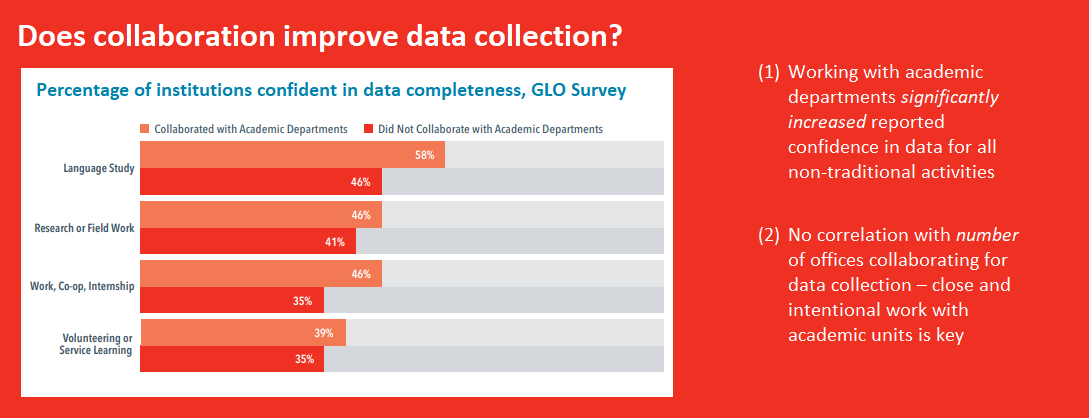Module 3: Building Your Data Collection Team through Intracampus Collaboration
Module 3 highlights the many ways that study abroad offices facilitate and participate in collaboration with faculty, staff, and other offices to strengthen data collection through increased communication and support for overseas programming.
This module is designed to provide promising practices for strengthening relationships between academic, institutional research, and study abroad offices. It will demonstrate how to build support from senior leadership for graduate learning overseas data collection.
A list of considerations following each subsection invite you to think critically about your current practices. Case studies are presented at the end of the module to provide a detailed example of how to implement a specific strategy.
Key questions for this module:
|
Key take-aways:
|

How do study abroad personnel establish relationships with other offices across campus?
Senior International Officers and the study abroad personnel with whom they work are traditionally viewed as international education experts at their institution and are sought after by colleagues to discuss undergraduate international programming. This same identity requires a bit more effort to establish with colleagues who work with graduate level students. Study abroad personnel need to actively demonstrate their expertise and the ways in which a study abroad office can support graduate faculty and programs to simplify and streamline processes related to graduate learning overseas. Through these efforts, study abroad personnel can build essential partnerships and a data collection team able to report on graduate learning overseas.

- ESTABLISH A CENTRAL ROLE. The responsibilities of this role may include to: liaise across graduate schools and campuses to collect data, report data to risk management and institutional research offices, and collaborate with study abroad offices on graduate student forms, materials, and procedures related to learning overseas. At some institutions this role may be filled be the Senior International Officer who leads and facilitates international education efforts across their institution. (See Belmont University Case Study)
- ESTABLISH LEARNING OVERSEAS ADVISORY GROUP. Lead by a Senior International Officer or other international education leadership, the advisory group should include representatives from different graduate schools and relevant campus administrative offices, such as career services. Identify areas of mutual benefit in collecting and using data. Share best practices of specific schools or disciplines that have a positive record of using data to evaluate the effect of their programs and demonstrate success.
- CONDUCT TRAININGS. Demonstrate your expertise by holding trainings with faculty related to integrating international education activities and outcomes, and the value of collaborating with the study abroad office. Hold trainings with administrative staff to review institutional travel policies and student registration requirements. (See University of South Carolina Case Study)
- SUPPORT PROGRAM PLANNING. Reconsider offering credit for opportunities that are currently non-credit bearing overseas opportunities, such as service learning, together with appropriate departments and faculty. Leverage the conversation to identify and support the needs of these programs, including around their ability to collect and report data on graduate student learning overseas, and the resources available through the study abroad office.
|
Considerations:
|

In what ways can leadership at your institution support graduate learning overseas data collection?
Having visible support from institutional leadership can go a long way with putting in place the elements necessary to be set up for successful graduate learning overseas data collection.
- COMMUNICATE. Send a campus-wide email from senior leadership reminding students, faculty, and staff of international travel policies that require students to register their travel with your institution (see Module 2 for suggested registration policies and systems).
- ENCOURAGE COMPLIANCE. Encourage approvals for financial reimbursement of graduate student overseas programming, including faculty-led programs, to include confirmation that the expenses and program were reviewed by the study abroad office. (See Module 2 for suggestions on linking financial reimbursements to travel registration)
- DIVERSIFY STRATEGIES. Use multiple means of communication (e.g. email, faculty advisors, financial aid policies) to ensure graduate students are aware of their responsibility to report plans for participation in learning overseas, even when traveling independently.
|
Considerations:
|